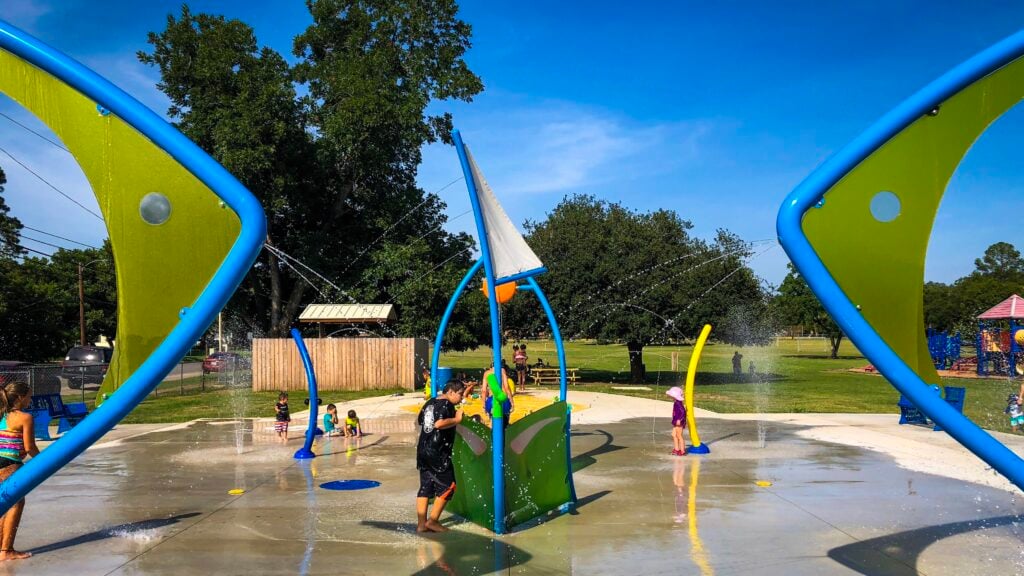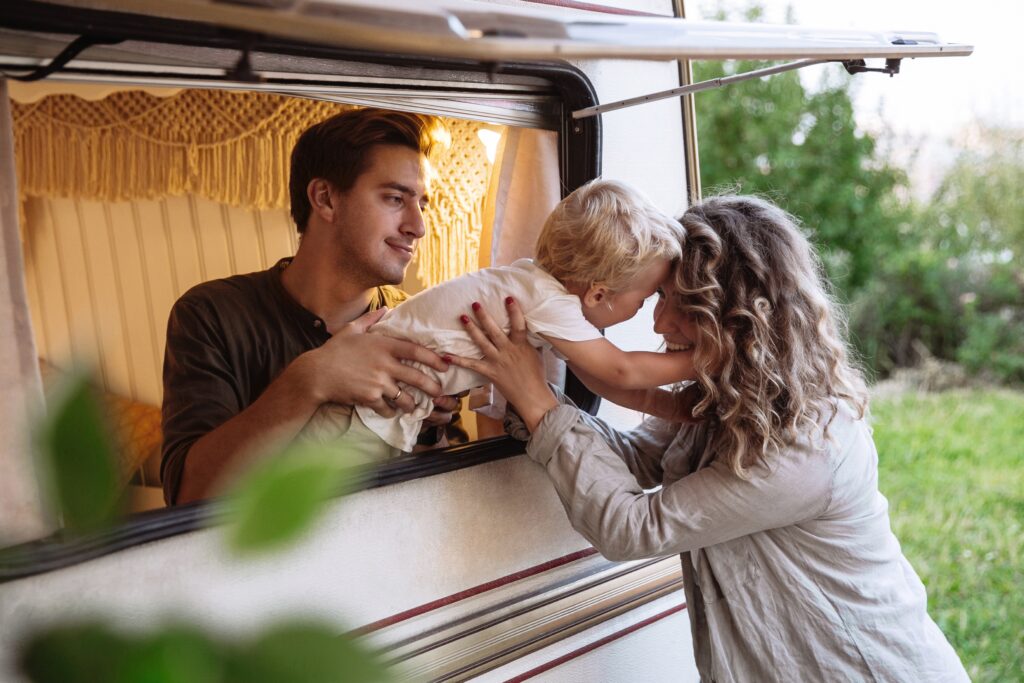Is RV Living with Kids Possible?
Maybe you have two kids and a dog, or four kids and two cats. How can you possibly make the RV lifestyle work for you? You have questions about space, travel days, homeschool, and more. Our guide to RV living with kids will inspire you to get on the road and journey together!
While you can absolutely travel the country, explore national parks, taste different cuisines, and experience new cultures and lifestyles with your kids, that doesn’t mean RV living with kids is easy. Let’s take a look at a few tips to ease your travel experience.

Tips for RV Living with Kids
RV living with kids is different for every family. Even within the same family, the lifestyle is different for each child. But there are some helpful tips that many RV families agree to make life more enjoyable for everyone.
1. They Need Their Space
Depending on the size of your family, you may or may not be able to have a bed for each child. If possible, find a rig with a bunk room or a dedicated space for your children and their belongings. If they don’t have a place to put their stuff, they may feel unimportant. Help each child find a space to call their own and be respectful of that space.
2. They Need Stuff to Do
Luckily, many campgrounds were made with kids in mind. You’ll find playgrounds, basketball courts, volleyball courts, corn hole boards, swimming pools, and more. To easily search for family-friendly RV parks and campgrounds, go to RV LIFE Campgrounds and select the “Park Features” filter, then apply “Kid Friendly” to see the results.
The Jellystone resorts, for example, are great for RV families. But most families can’t afford to stay at Jellystone resorts all the time. The good news is many other campgrounds recognize the need for entertainment. You’ll find movie nights, crafts, game rooms, splash pads, and more.

3. Travel Days Require Prep and Planning
This is especially true for younger children. You may have to limit how far you travel in one day. Is the 2-2-2 rule going to work for your family? Do you need to stop every hour for potty breaks and stretches? This will vary from family to family. Know your kids’ needs.
Also, keep food in mind. Pack snacks. Lots and lots of snacks. Many families try to eat healthily and provide good, quality snacks and meals for their kids. On travel days, you may have to be willing to let that go a little bit. The same with screen time. If you tend to limit screen time on regular days, you may have to tweak the rules a bit on travel days just to make the experience more enjoyable for you and your kids.
Finally, plan ahead. If you can pack up the night before you check out, do that. It will make the morning much easier and less hectic because you won’t be in a rush. Give the kids roles and responsibilities. How can they help with packing? Maintain a routine so they learn how they can help the entire family by doing their job on travel days.
4. Maintain a Routine
Routine is helpful for children. If they know what to do on a travel day, they do it. If they don’t know what to do or if their job changes every time you go somewhere new, they’ll ask questions, perhaps do the task incorrectly, or get frustrated. Write everyone’s job down on a whiteboard and keep it the same if at all possible.
This isn’t just true for travel days, though. RV living with kids also often means some homeschooling. Maintaining a routine during the day sets clear expectations for children. They know what happens first (maybe school), then what happens next (maybe a hike), and then how the day comes to an end (maybe a movie). Allow for flexibility and spontaneity but keep a routine, so children understand expectations.

5. Join Groups to Meet Other Families on the Road
Don’t do this life alone. There are so many full-time families on the road. Facebook is a great resource to connect with other like-minded families who value travel. If you have questions about this life, others have gone through it already and can help. If you want suggestions for things to do, other families can point you in the right direction.
6. Keep Toys Minimal, But Let the Kids Choose the Toys they Bring
This idea ties into the earlier tip about each child having a dedicated space. Your kids need to feel valued. One way you can help them, in the beginning, is by allowing them to choose the toys they bring. This may be extremely difficult for some children.
One idea is to have three piles: a sell pile, a give away pile, and a keep pile. As your children go through their toys, they choose which pile to put their toys in. If it’s a struggle, tell them that by selling some toys, they can make some extra money to buy new things or to see fun places. Help kids understand that by giving away their toys, they’re helping other kids who may not have any toys. Here are more downsizing tips for the whole family: 5 Shockingly Simple and Effective Downsizing Tips.
7. Get Them Involved in Trip Planning
One of the most exciting parts of RV living with kids is trip planning. Why can’t children have a say? Invite your children to look at a map, learn about different places, and then choose a state or location they’d like to visit. Maybe draw a circle around a part of the country you’re going to see to keep the options more minimal and encourage your children to do some research. You might be surprised but what they choose.
8. Choose a Curriculum or Style that Fits Their Personalities and Learning Styles
Homeschooling is one of the biggest challenges for RV living with kids. For families transitioning to homeschooling from public schooling, the options can seem endless. You may feel pressure to meet certain expectations. Do what works for you.
Depending on your home base state, homeschooling laws vary. Research the laws relevant to you. Once you understand the rules, choose what works for your family. This may be traditional homeschooling with a curriculum like Charlotte Mason or Sonlight. Or it may look more like un-schooling where you allow your children to learn on their own as they experience the travel lifestyle.
This is where knowing your children’s personalities and learning styles is really important. If they need more structure, routine, and organization (like a public school classroom), explore the traditional homeschool route and find the curriculum that fits. If you have children who are more artistic or hands-on or struggle in sit-down classroom experiences, find a curriculum that meets those needs.
Many RV families who’ve been on the road for several years will say that blocking out the outside expectations is important. What other people say or think about your children’s learning can be disruptive and discouraging. Do what works for you and your kids.
9. Keep Them Involved
This connects to the travel day tip about having roles for each child. Help your children understand that they matter. Whether it’s cooking, cleaning, doing laundry, washing the RV, or some other chore, keep them involved. Even the youngest child can learn to pick up their toys on “cleaning day.” Remind them that if they don’t follow through with their responsibilities, the whole family suffers.

RV Living With Kids Can Be the Best Decision You’ll Ever Make for Your Family
RV living with kids is life-changing. Reading about the history of the Cherokee people at school is very different from experiencing the life of the Cherokee people by watching “Unto These Hills” in North Carolina. Watching a video about the battle at Fort Sumter at school is very different from walking on the actual site in South Carolina.
RV living with kids isn’t without challenges. Hopefully, these tips will give you the confidence to hit the road and experience life together. What challenges are you facing as you contemplate taking your family on the road?

simple don`t and leave the mother in-law home. Do you want your kid to grow up in a trailer park? Wait till their all grown then go and have fun without stress. I have a 40` Motana and have been asked how many does it sleep? The answer is 2.